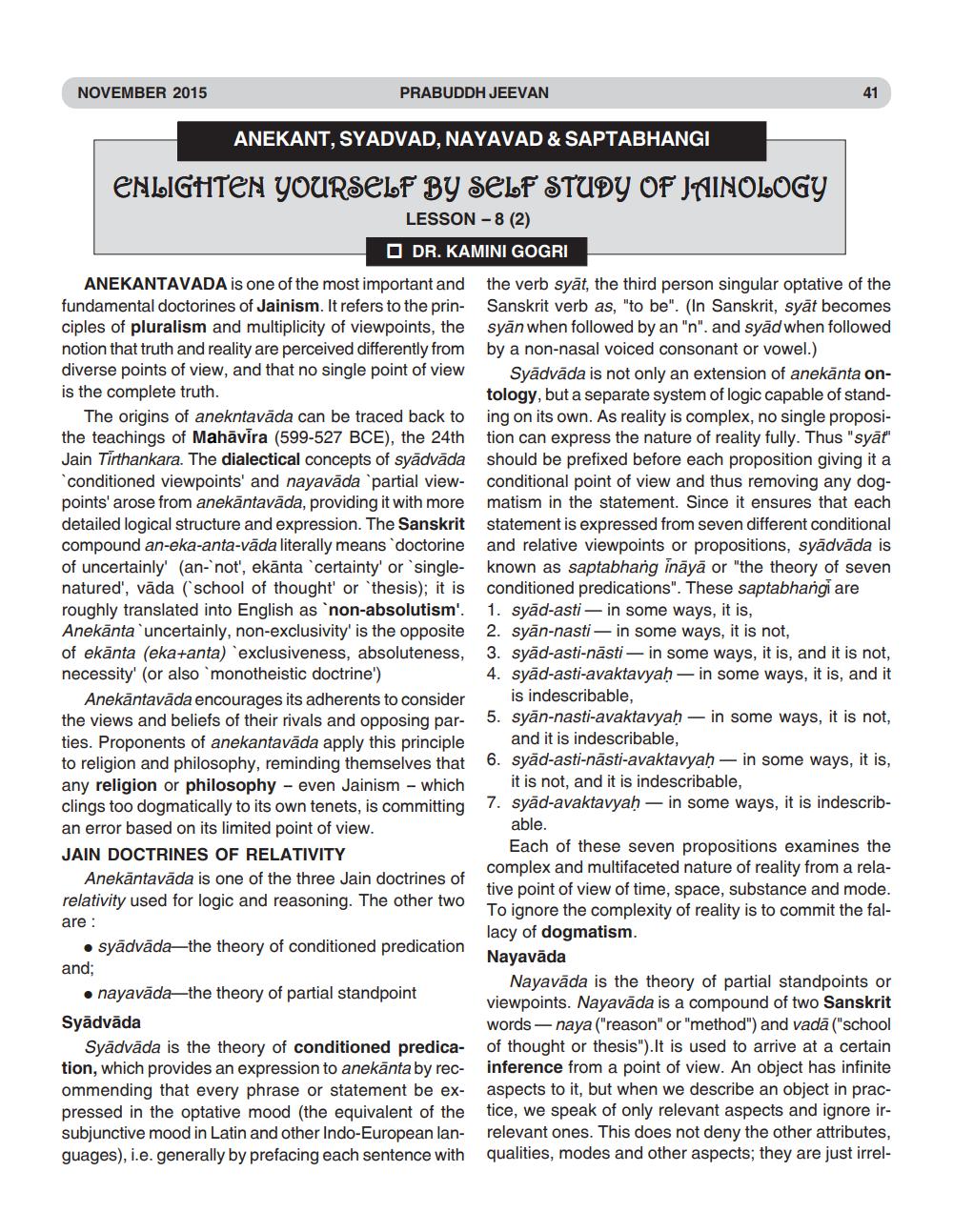________________
NOVEMBER 2015
PRABUDDH JEEVAN
41
ANEKANT, SYADVAD, NAYAVAD & SAPTABHANGI
ENLIGHTEN YOURSELF BY SELF STUDY OF JAINOLOGY
LESSON - 8 (2)
O DR. KAMINI GOGRI ANEKANTAVADA is one of the most important and the verb syāt, the third person singular optative of the fundamental doctorines of Jainism. It refers to the prin- Sanskrit verb as, "to be". (In Sanskrit, syāt becomes ciples of pluralism and multiplicity of viewpoints, the syān when followed by an "n". and syād when followed notion that truth and reality are perceived differently from by a non-nasal voiced consonant or vowel.) diverse points of view, and that no single point of view Syādvāda is not only an extension of anekānta onis the complete truth.
tology, but a separate system of logic capable of standThe origins of anektavāda can be traced back to ing on its own. As reality is complex, no single proposithe teachings of Mahāvira (599-527 BCE), the 24th tion can express the nature of reality fully. Thus "syāt" Jain Tirthankara. The dialectical concepts of syādvāda should be prefixed before each proposition giving it a
conditioned viewpoints' and nayavāda 'partial view- conditional point of view and thus removing any dogpoints' arose from anekāntavāda, providing it with more matism in the statement. Since it ensures that each detailed logical structure and expression. The Sanskrit statement is expressed from seven different conditional compound an-eka-anta-vāda literally means 'doctorine and relative viewpoints or propositions, syādvāda is of uncertainly' (an-not', ekānta certainty' or 'single- known as saptabhang ināyā or "the theory of seven natured', vāda (school of thought' or 'thesis); it is conditioned predications". These saptabhangi are roughly translated into English as non-absolutism'. 1. syād-asti — in some ways, it is, Anekānta uncertainly, non-exclusivity' is the opposite 2. syān-nasti — in some ways, it is not, of ekānta (eka+anta) 'exclusiveness, absoluteness, 3. syād-asti-năsti — in some ways, it is, and it is not, necessity' (or also 'monotheistic doctrine')
4. syād-asti-avaktavyaḥ- in some ways, it is, and it Anekantavāda encourages its adherents to consider is indescribable, the views and beliefs of their rivals and opposing par- 5. syān-nasti-avaktavyah - in some ways, it is not, ties. Proponents of anekantavāda apply this principle and it is indescribable, to religion and philosophy, reminding themselves that 6. syād-asti-năsti-avaktavyah - in some ways, it is, any religion or philosophy - even Jainism - which it is not, and it is indescribable, clings too dogmatically to its own tenets, is committina 7. syād-avaktavyah - in some ways, it is indescriban error based on its limited point of view.
able. JAIN DOCTRINES OF RELATIVITY
Each of these seven propositions examines the
complex and multifaceted nature of reality from a relaAnekāntavāda is one of the three Jain doctrines of
tive point of view of time, space, substance and mode. relativity used for logic and reasoning. The other two
To ignore the complexity of reality is to commit the falare :
lacy of dogmatism. • syādvāda-the theory of conditioned predication
Nayavāda and;
Nayavāda is the theory of partial standpoints or • nayavāda—the theory of partial standpoint
viewpoints. Nayavāda is a compound of two Sanskrit Syādvāda
words-naya ("reason" or "method") and vadā ("school Syādvāda is the theory of conditioned predica- of thought or thesis"). It is used to arrive at a certain tion, which provides an expression to anekānta by rec- inference from a point of view. An object has infinite ommending that every phrase or statement be ex- aspects to it, but when we describe an object in pracpressed in the optative mood (the equivalent of the tice, we speak of only relevant aspects and ignore irsubjunctive mood in Latin and other Indo-European lan- relevant ones. This does not deny the other attributes, guages), i.e. generally by prefacing each sentence with qualities, modes and other aspects; they are just irrel




